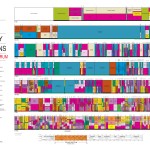 For CNET this morning, I write about the latest tempest in the AT&T/T-Mobile USA merger teapot: cellular backhaul or “special access” as its known in the industry.
For CNET this morning, I write about the latest tempest in the AT&T/T-Mobile USA merger teapot: cellular backhaul or “special access” as its known in the industry.
Like a child sitting on Santa’s lap at the mall, Sprint CEO Dan Hesse included backhaul in his wish list of conditions he’d like to see attached to the deal. Yesterday, Public Knowledge duly confirmed that yes, backhaul is a “multiplier” problem for the deal.
(Sprint says they would like the deal blocked, but that is mere posturing. What they really want is to use the FCC’s bloated and unprincipled merger review process to sneak in as many private concessions for themselves as they can get. And who can blame them for trying? More on that in a moment.)
For those who don’t know, backhaul is the process of moving cellular traffic (voice and data) to other high-speed networks (traditionally landline copper but now including cable, fiber, microwave and local Ethernet) to transport them to their ultimate destination. As mobile use increases, of course, the necessity of reliable, high-speed backhaul to keep overall performance up becomes more critical than ever.
Continue reading →
 I’ve written two articles on the Protect IP Act of 2011, introduced last week by Sen. Leahy (D-Vt.).
I’ve written two articles on the Protect IP Act of 2011, introduced last week by Sen. Leahy (D-Vt.).
For CNET, I look at some of the key differences, better and worse, between Protect IP and its predecessor last year, known as COICA.
On Forbes this morning, I have a long meditation on what Protect IP says about the current state of the Internet content wars. Copyright, patent, and trademark are under siege from digital technology, and for now at least are clearly losing the arms race.
The new bill isn’t exactly the nuclear option in the fight between the media industries and everyone else, but it does signal increased desperation. Continue reading →
 For Forbes.com this morning, I take a close look at last month’s controversial FCC order requiring facilities-based wireless carriers to negotiate data roaming agreements with other carriers.
For Forbes.com this morning, I take a close look at last month’s controversial FCC order requiring facilities-based wireless carriers to negotiate data roaming agreements with other carriers.
There are business, technical, and legal reasons why the order stands on unsteady ground, which the article looks at in detail.
The order, by encouraging artificial competition in nationwide mobile broadband, could also undermine arguments against AT&T’s merger with T-Mobile USA.
How so? If every regional, local, or rural carrier can offer their customers access to the nationwide coverage of Verizon, AT&T, or Sprint, on terms overseen for “commercial reasonableness” by the FCC, what’s the risk of consumer harm from combining AT&T and T-Mobile’s infrastructure? Indeed, doing so would create stronger nationwide 3G and 4G networks for other carriers to use. In that sense, it’s actually pro-competitive, and a pragmatic solution to spectrum exhaustion. Continue reading →
I’ve written a long article this morning for CNET (See “Privacy panic debate: Whose data is it?”) on the discovery of the iPhone location tracking file and the utterly predictable panic response that followed. Its life-cycle follows precisely the crisis model Adam Thierer has so frequently and eloquently traced, most recently here on TLF.
In particular, the CNET article takes a close and serious look at Richard Thaler’s column in Saturday’s New York Times, “Show us the data. (It’s ours, after all.)” Thaler uses the iPhone scare as occassion to propose a regulatory fix to the “problem” of users being unable to access in “computer-friendly form” copies of the information “collected on” them by merchants. Continue reading →
Following AT&T’s announcement last month of its planned acquisition of T-Mobile USA, pundits and other oddsmakers have settled in for a long tour of duty. Speculation, much of it uninformed, is already clogging the media about the chances the $39 billion deal—larger even than last year’s merger of Comcast and NBC Universal—will be approved.
Both the size of the deal and previous consolidation in the communications industry lead some analysts and advocates to doubt the transaction will or ought to survive the regulatory process.
Though the complex review process could take a year or perhaps even longer, I’m confident that the deal will go through—as it should. To see why, one need only look to previous merger reviews by the Department of Justice and the Federal Communications Commission, both of which must approve the AT&T deal. Continue reading →
On Forbes this morning, I analyze the legislative and judicial challenges to last year’s FCC Open Internet rules, the so-called net neutrality order.
Despite the urgency of Friday’s budget machinations, the House took time out to pass House Joint Resolution 37, which “disapproves” the FCC’s December rulemaking. If passed by the Senate and not vetoed by President Obama, HJR 37 would effectively nullify the net neutrality rules, and ensure the FCC cannot pass alternate versions of them absent new authority to do so from Congress.
Most commentators believe that the House action was merely symbolic. Passage in the Senate requires only a simple majority, but the neutrality fight has turned violently partisan since the mid-term elections and getting a few Democratic Senators on-board may be hard. More to the point, the White House last week pre-emptively threatened to veto the resolution.
Continue reading →
I’ve posted a long article on Forbes.com this morning on the Global Network Initiative. A non-profit group aimed at improving human rights though the agency of information technology companies, GNI has never really gotten off the ground.
Since its formal launch in 2008, following two years of negotiations among tech companies, human rights groups and academics, not a single company has agreed to join beyond the original members–Google, Yahoo and Microsoft.
This despite considerable pressure from supporters of GNI, including Senator Richard Durbin (D-IL), Chair of the Senate Judiciary’s Subcommittee on Human Rights. Indeed, in the wake of uprisings in Tunisia, Egypt, Libya and elsewhere and the seminal role played by social media and other IT, a full-court press has been launched against Facebook and Twitter in particular for failing to sign up. Continue reading →
In the rush of ink that flowed yesterday over AT&T’s announced merger with T-Mobile USA, I posted a long piece on CNET calling for calm, reasoned analysis of the deal by regulators, chiefly the Department of Justice and the FCC.
Since the details of the deal have yet to be fleshed out, it’s hard to say much about the specifics of how customers will be affected in the short or long term. My CNET colleague Maggie Reardon, however, does an excellent job laying out both the technical and likely regulatory issues in a piece posted today from the CTIA conference. Continue reading →
What I hoped would be a short blog post to accompany the video from Geoff Manne and my appearances this week on PBS’s “Ideas in Action with Jim Glassman” turned out to be a very long article which I’ve published over at Forbes.com.
I apologize to Geoff for taking an innocent comment he made on the broadcast completely out of context, and to everyone else who chooses to read 2,000 words I’ve written in response.
So all I’ll say here is that Geoff Manne and I taped the program in January, as part of the launch of TechFreedom and of “The Next Digital Decade.” Enjoy!
 I’ve written posts today for both CNET and Forbes on legislation introduced yesterday by Senators Olympia Snowe and John Kerry that would require the FCC and NTIA to complete inventories of existing spectrum allocations. These inventories were mandated by President Obama last June (after Congress failed to pass legislation), but got lost at the FCC in the net neutrality armageddon.
I’ve written posts today for both CNET and Forbes on legislation introduced yesterday by Senators Olympia Snowe and John Kerry that would require the FCC and NTIA to complete inventories of existing spectrum allocations. These inventories were mandated by President Obama last June (after Congress failed to pass legislation), but got lost at the FCC in the net neutrality armageddon.
Everyone believes that without relatively quick action to make more spectrum available, the mobile Internet could seize up. Given the White House’s showcasing of wireless as a leading source of new jobs, investment, and improved living conditions for all Americans, both Congress and President Obama, along with the FCC and just about everyone else, knows this is a crisis that must be avoided.
Indeed, the National Broadband Plan estimates conservatively that mobile users will need 300-500 mhz of new spectrum over the next 5-10 years. Continue reading →
 For CNET this morning, I write about the latest tempest in the AT&T/T-Mobile USA merger teapot: cellular backhaul or “special access” as its known in the industry.
For CNET this morning, I write about the latest tempest in the AT&T/T-Mobile USA merger teapot: cellular backhaul or “special access” as its known in the industry.



 The Technology Liberation Front is the tech policy blog dedicated to keeping politicians' hands off the 'net and everything else related to technology.
The Technology Liberation Front is the tech policy blog dedicated to keeping politicians' hands off the 'net and everything else related to technology.